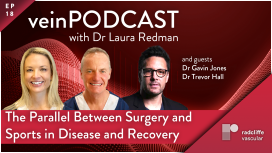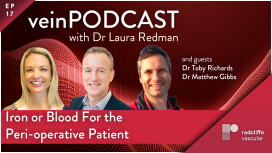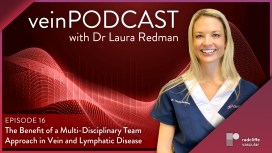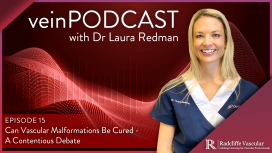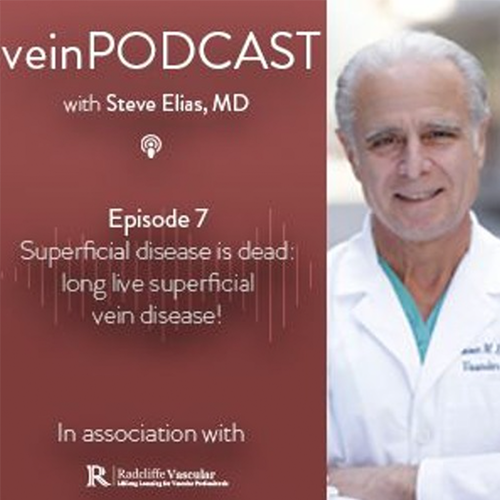
Superficial vein disease is a relatively non-harmful disease that significantly affects a patient’s quality of life. Major risk factors include genetics, multiple pregnancies and a job with a lot of standing. More prevalent in females and often aggravated by poor lifestyle choices such as smoking and obesity, it’s a disease that is difficult for physicians to prevent or control.
So, is superficial disease dead or not?
Join Dr Steve Elias for this provocative discussion with a world-renowned expert panel: Prof Alun Davies (Imperial College London, UK), Ellie Dillavou, MD, (Duke Regional Hospital, US), Dr Margaret Mann (Innova Dermatology, US), and Dr Lowell Kabnick (NYU Vein Center, US) to discuss the issues surrounding superficial vein disease, with a focus on treatment options and technologies.
In this episode they discuss:
[03.00] Should we prevent superficial vein disease: part 1?
[05.25] How good are we at treating superficial vein disease?
[07.10] What are we best at treating in vein disease?
[10.25] Spider veins: treatment and technologies. Are we happy with results?
[19.02] Varicosity treatment: should we be looking for new types?
[27.00] The perfect catheter devices.
[33.12] Should we try to prevent superficial vein disease: part 2?
Listen now for the latest episode from the veinPODCAST series.
Prefer video? View vodcast video episode.
Hosted by @DrSteveElias and produced by Radcliffe Vascular. Follow us on social media for the latest updates on the next episode @RadcliffeVASCU today!
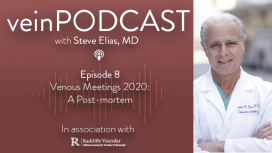
Will a phoenix rise from the ashes and what will future congress sessions look like in the future?
Non-societal representatives, Manjit Gohel (Charing Cross), Jose Almeida (IVC), Antonio Gasparis (Venous Symposium), Nicos Labroupoulos (EVM) and Prof Frank Veith (VEITH), join the discussion today to examine the issues impacting venous meetings in 2020.
Listen to them discuss the impact that COVID-19 has had on society meeting attendance this year and what’s been learnt about hosting meetings as a result. Hear them discuss the pros and cons of virtual meeting attendance and their thoughts around the challenges of postponement and reinvigoration, as they consider what the future might hold for education in 2021/22.

Will a phoenix rise from the ashes and what will future congress sessions look like in the future?
Non-societal representatives, Manjit Gohel (Charing Cross), Jose Almeida (IVC), Antonio Gasparis (Venous Symposium), Nicos Labroupoulos (EVM) and Prof Frank Veith (VEITH), join the discussion today to examine the issues impacting venous meetings in 2020.
Listen to them discuss the impact that COVID-19 has had on society meeting attendance this year and what’s been learnt about hosting meetings as a result. Hear them discuss the pros and cons of virtual meeting attendance and their thoughts around the challenges of postponement and reinvigoration, as they consider what the future might hold for education in 2021/22.
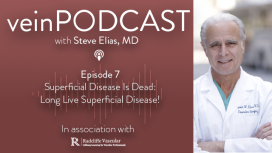
So, is superficial disease dead or not?
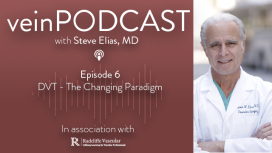
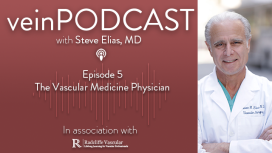
They look at a number of issues surrounding this underrepresented area of expertise, namely the importance of the relationship between the vascular surgeon, vein specialists and vascular medicine and their broad spectrum of specialities.
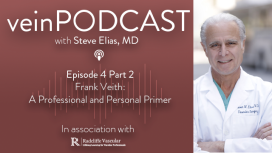
They discuss a variety of issues including the ethics of money and malpractice and the importance of educating patients on vascular surgery and vascular disease. Listen to Frank’s take on the VEITH Symposium’s success, how he’d like to see it develop in the future and why he feels interventional cardiologists and radiologists are essential for VEITH’s long-term growth.
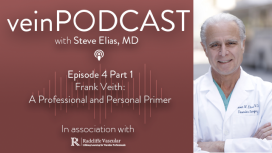
Part-one sees them discuss a variety of topics in the vascular world including the origins and growth of the VEITHsymposium™ (which is now in its 47th year!), the importance of leadership, working with cardiologists and the controversial issues around procedure abuse in medicine.
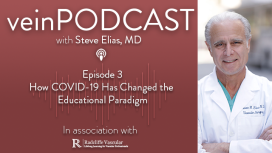
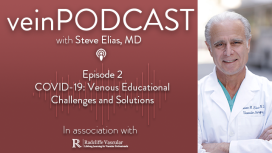
Hear them relate the impact that COVID-19 has had on various interventional procedures and the effect it’s had on the organisation and timing of key educational meetings. Finally, they express their thoughts on the long-term changes on educational paradigms that the post-COVID era may bring such as live meetings, hybrid meetings, eLearning and the use of webinar-based platforms.
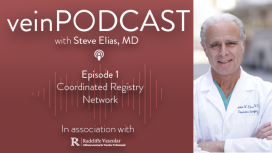
Steve Elias meets with Jens Eldruip-Jorgensen (Maine, US), Marlin Schul (Indiana, US) and Nicholas Osbourne (Michigan, US) to find out more about the aims of the Coordinated Research Network and its impact on real-world practice to treat patients with venous disease. Highlights include discussions around the benefits and challenges of registry data, as well as a look at the current data coming out from the CRN and its implications for clinicians.
Submit your questions/feedback to Steve via: podcast@radcliffe-group.com. Hosted by @DrSteveElias. Produced by @RadcliffeVASCU.
